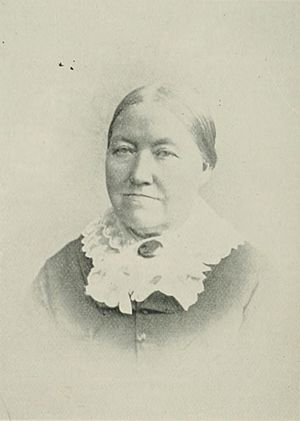Louisa Morton Greene facts for kids
Quick facts for kids
Louisa Morton Greene
|
|
|---|---|
 |
|
| Born | Louisa Morton Willard May 23, 1819 Ashburnham, Massachusetts, U.S. |
| Died | March 5, 1900 (aged 80) |
| Resting place | Saint Paul's Cemetery, Alexandria, Virginia, U.S. |
| Occupation | reformer, writer, abolitionist, suffragist, women's rights worker, temperance worker, and Civil War relief worker |
| Language | English |
| Spouse |
Jonas Greene
(m. 1841) |
Louisa Morton Greene (born Louisa Morton Willard; May 23, 1819 – March 5, 1900) was an important American woman in the 1800s. She was a writer and a reformer. This means she worked to make society better.
Louisa was an abolitionist, fighting to end slavery. She was also a suffragist, working for women's right to vote. She supported women's rights and the temperance movement, which aimed to reduce alcohol use. During the American Civil War, she helped soldiers and their families.
Even though she didn't have much schooling, Louisa was one of the first American women to challenge unfair pay. She refused to accept less money than a man for doing the same job. She used her writing and speeches to champion important causes.
Contents
Early Life and Learning
Louisa Morton Willard was born in Ashburnham, Massachusetts, on May 23, 1819. Her family had lived in New England for many generations. Her father, Henry Willard, was a blacksmith and farmer.
Sadly, Louisa lost both her parents when she was very young. This meant she didn't get much formal schooling. By the age of 13, she had to start working to support herself.
Standing Up for Fair Pay
Louisa found a job in a woolen factory in Dedham, Massachusetts. She worked long hours, sometimes 14 hours a day. Her pay was very low, only $1.00 to $2.00 per week, plus food.
Despite the long hours, she was determined to learn. She even taught herself to write by practicing on the spools of thread! She spent her free time reading and studying. Louisa was also very careful with her money. By age 17, she had saved $150.00. This was a lot of money back then.
Then came a big moment. Louisa saw how unfairly women were treated in the workplace, especially with pay. One day, she was asked to do a man's job at a spinning machine. She did it well, and her boss was happy. But when payday came, she asked for the same pay the man had received. Everyone was shocked!
Louisa was brave and stood her ground. She said she wouldn't go back to the machine unless she was paid the same rate. Because of this, she was fired. But a few weeks later, the factory called her back and offered her higher pay. This was a big victory for her and for women's rights in the workplace.
Teacher and Reformer
In 1840, Louisa became a school teacher near Portsmouth, New Hampshire. There, she met Jonas Greene from Maine. They got married in 1841. Jonas Greene later became a successful politician. He often said that his wife's support was a big reason for his success.
Louisa and Jonas moved to Oxford County, Maine. This was a less populated area at the time. Even with her family duties, Louisa found time to get involved in important social causes. She learned about the "Water cure" system, a natural way to treat illness. She became very skilled at caring for the sick, and people in her community often asked for her help.
Fighting for Change
In 1850, Louisa became a strong voice against slavery. She helped organize groups of women to fight for the anti-slavery cause. They shared books and articles, including Uncle Tom's Cabin, which was a very influential book against slavery. Louisa also wrote many articles for local newspapers.
During the American Civil War, Louisa worked tirelessly to help. She collected and prepared supplies for hospitals and sent them to soldiers. For many years, her newspaper articles covered a wide range of topics. She was an early supporter of both the temperance movement (reducing alcohol use) and the suffrage movement (women's right to vote). She gave speeches and wrote to promote these causes.
In 1869, Louisa moved with her family to Manassas, Virginia. Her husband, Jonas, passed away there in 1873. As she grew older, Louisa became less active in public work. She died on March 5, 1900. Louisa Morton Greene is remembered as a pioneering woman who fought for fairness and equality throughout her life.
See also
In Spanish: Louisa Morton Greene para niños
 | Selma Burke |
 | Pauline Powell Burns |
 | Frederick J. Brown |
 | Robert Blackburn |

